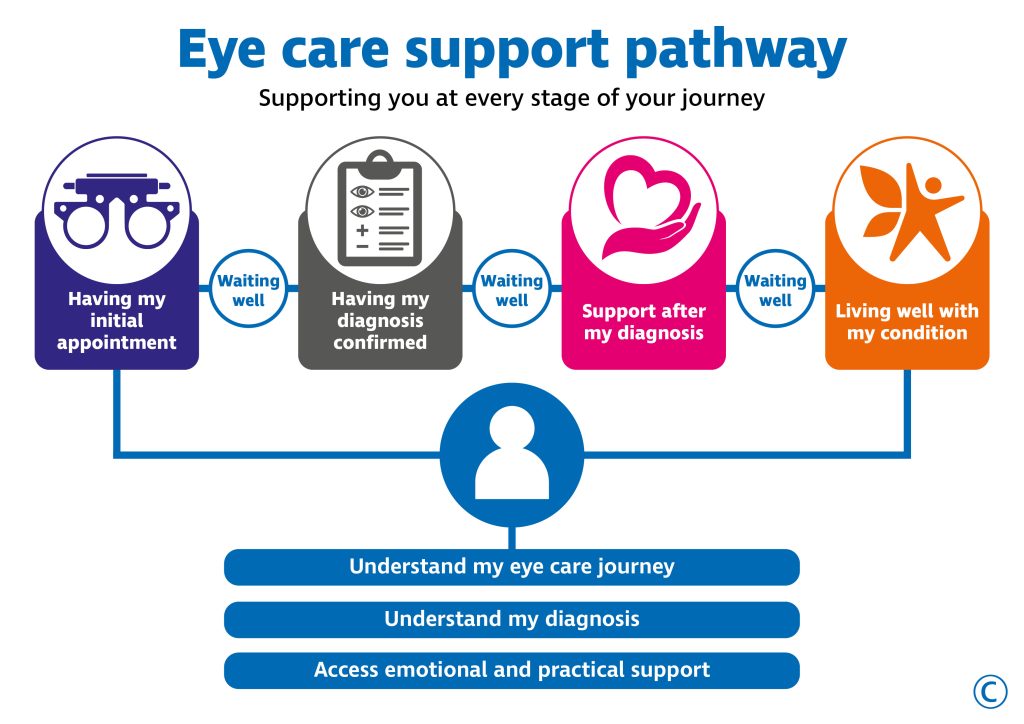The Royal National Institute of Blind People (RNIB) Collaborate for Good event brings together leading organisations from across the eye care and sight loss sector to unveil a UK wide Eye Care Support Pathway. The Pathway is a new framework to ensure patients have timely access to information, advice and support throughout their eye care journey.
The over-arching ambition for the Eye Care Support Pathway is that from the moment someone realises that “something isn’t quite right” with their sight, through to diagnosis and being able to live confidently – and independently – with their condition, they have access to the information, and support they need. Patients should be able to actively participate and take control of their eye care journey.
With the level of demand placed on NHS practitioners, eye care departments, and with the need for each individual appointment never greater than it is today there is a real need for change. There were more than 8 million outpatient eye care appointments in the UK in 2021/22, the highest footfall for any speciality and RNIB’s research has found people often find it difficult to access eye health and sight loss information, services and support.
The event provides a great example of the sector collaborating with the NHS, social care, people with lived experience and the Third Sector. More than 20 organisations have already endorsed the Eye Care Support Pathway. Two years of work have led up to the publication of the Pathway -informed by detailed research, the insight of more than 500 people with lived experience and more than 30 bodies who represent professionals and patients across the sector.
Tina Garvey, Chief Executive of Retina UK, said the launch of the Eye Care Support Pathway was a significant step towards working together to create positive change for those diagnosed with inherited sight loss conditions.
She said: “We are delighted that members of our community and our staff have had the opportunity to share their knowledge, expertise and, most importantly, their lived experience to help shape this new pathway. This means the specific needs of those with inherited sight loss are acknowledged in the pathway. For example, the opportunity to access genetic testing and counselling, to get involved in research activity, and to access timely emotional and practical support to enable them to make informed choices and live their best lives.”
RNIB’s Chief Executive Officer Matt Stringer said: “We know that the experience of people with eye care needs and sight loss varies greatly across the UK. It’s not acceptable that anyone, regardless of their condition or where they live, does not get the right help and support at the right time.
“It’s encouraging to see so many partners are joining us for the event to work towards establishing, implementing, and delivering the Eye Care Support Pathway. Today is an important milestone, but only the beginning of the work we need to achieve together, bringing everyone together and moving forward to better support people across their eye care journey.”
Louisa Wickham, National Clinical Director for Eye care for NHS England, said: “Success in transforming the way eye care services are provided to meet the increasing demand on the NHS will require the whole sector to transform its approach to improving patient care. The Eye Care Support pathway puts the person at the centre of their eye care and sight loss journey. When the Eye Care Support Pathway is implemented, we must seize the opportunity to truly transform services, empower patients and improve outcomes.
“I’m grateful to our VI sector charity partners for collaborating in developing and publishing the Eye Care Support Pathway and in bringing people together to embed the framework into services and ensure that every person gets the right support at every stage.”
The event takes place at The View in Central London, the home of the Royal College of Surgeons, today (Thursday, November 16) with an invited audience. The next steps will see the VI Charity Sector Partnership working with NHS and social care bodies and those with lived experience to implement the Eye Care Support Pathway and the work will continue until everyone who has a sight loss diagnosis gets the support which is person-centred and timely from the outset and throughout their eye care journey.

